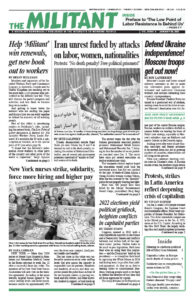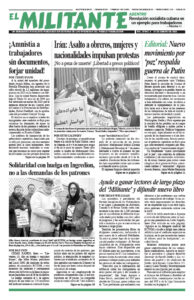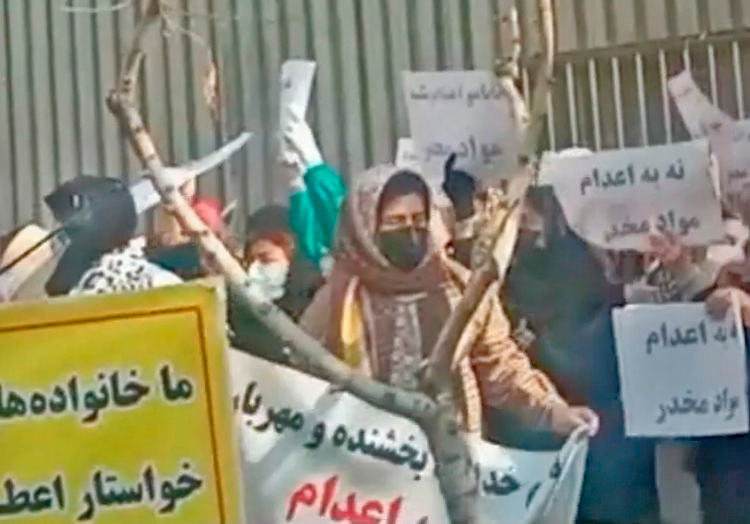Dozens demonstrated outside Rajai Shahr jail near Tehran Jan. 8 and 9 to demand an end to the death penalty, including the mother of Mohammad Ghobadlou, one of several anti-government protesters convicted of “enmity to God” and sentenced to death.
The protest began the day after the Iranian government executed political prisoners Mohammad Mehdi Karami and Mohammad Hosseini Jan. 7, bringing to four the number of recent protesters executed since Dec. 8. The courts have since put several executions on hold or ordered new trials.
The bourgeois-clerical regime hoped the executions would push back the movement across Iran that was sparked by the Sept. 16 death of Zhina Amini, a young Kurdish woman visiting Tehran, after she was arrested by the “morality” police for not properly wearing her hijab.
More than 500 people have been killed by the Islamic Revolutionary Guard Corps, paramilitary Basij thugs or police since daily protests swept the country over three months ago.
But even as the protests have declined — for now — the government’s trampling on the rights of oppressed nationalities, women, workers and students continues to provoke a response. Also underlying the protests is opposition to the capitalist government’s use of working people as cannon fodder for its military adventures in Iraq, Lebanon, Syria and Yemen.
The Tehran and Suburbs Bus Company Workers’ Union reported Jan. 12 that union activists Reza Shahabi and Hassan Saeedi were given six-year prison sentences, falsely accused of “propaganda activity against the Islamic Republic.” They were arrested after having attended a May Day rally last year against the rising cost of living and in defense of independent unions.
All “labor activists, teachers, students, activists of the women’s movement, arrested protesters and political prisoners should be released,” the union said.
Despite the arrest of 30 workers at a Dec. 24 rally in Asaluyeh, hundreds of oil workers joined protests at more than a dozen refineries, gas complexes and company offices Jan. 17. They are demanding wage increases and improvements in health insurance and pensions. “We won’t drop the flag of demanding our rights,” said their flyer for the actions.
Defense of Baha’i
The oppressed Baluch nationality in Sistan-Baluchistan province has been at the forefront of the fight against the regime’s repressive measures, along with the Kurdish nationality. Baluchistan-based Maulana Abdul-Hamid, Iran’s most prominent Sunni cleric, has come under fire from the government for condemning the arrests of women who don’t wear the hijab and his calls for freeing political prisoners and an end to discrimination against members of the Baha’i religious minority, a rare public position in Iran.
While the Shiite-based capitalist rulers of Iran treat the mostly Sunni oppressed nationalities like the Baluch and Kurds as second-class citizens, they view members of the Baha’i religion as “infidels.” Their faith is not recognized and they are denied identity cards. Many have been sentenced to death or imprisoned because of their religious beliefs.
Bring back the shah?
While anger by workers and youth against the regime’s repression continues in Iran, bourgeois-minded opponents of the Islamic Republic in Europe and the U.S. look to the imperialist ruling classes outside Iran to topple the regime.
Reza Pahlavi, son of the shah of Iran overthrown in the 1979 revolution; journalist Masih Alinejad; former soccer star Ali Karimi; and other exiles issued a joint statement Jan. 15 calling on “the international community” to put the Islamic Revolutionary Guard Corps “on the terrorist list.”
As part of their campaign they want opponents of the reactionary bourgeois-clerical regime to believe that “things were better” under the monarchy.
But Shah Mohammad Reza Pahlavi was imposed on the people of Iran by a 1953 coup organized by the CIA. During his rule, thousands of workers and political opponents were arrested and tortured by the notorious Savak secret police.
All wings of the bourgeois-clerical regime today claim the mantle of the massive, popular 1979 revolution that overthrew the shah. The opposite is true. They consolidated a counterrevolution in 1982 to 1983, giving new life to the repressive measures carried out by the monarchy, including the systematic denial of democratic rights and the trampling of the rights of women and oppressed peoples, from Kurds and Arabs to the Baluch.
Working people in Iran today have no intention of going back to the days of the shah. At a Jan. 13 demonstration in Zahedan, Baluch women chanted, “No to monarchy. No Supreme Leader. Democracy! Equality!”


